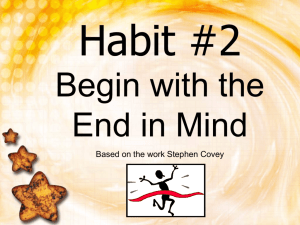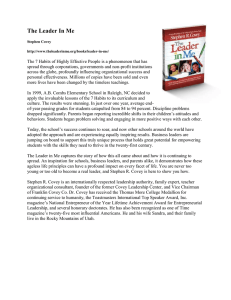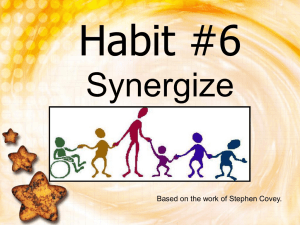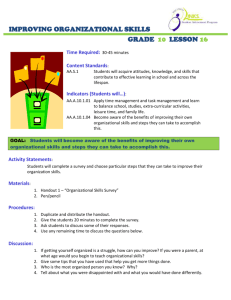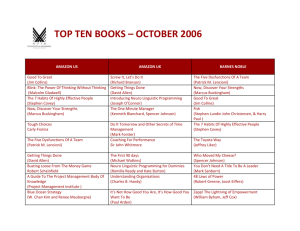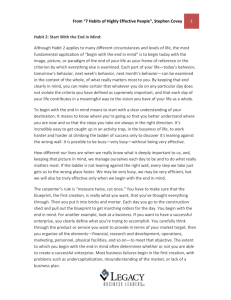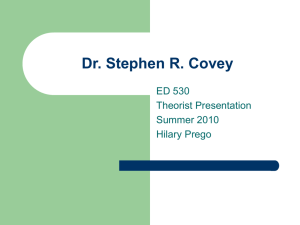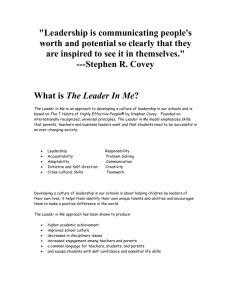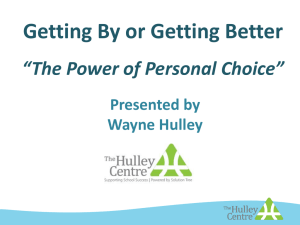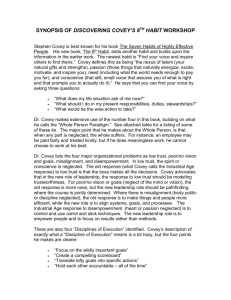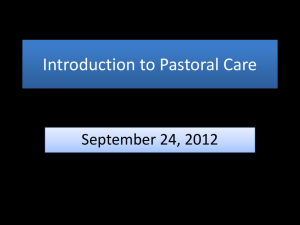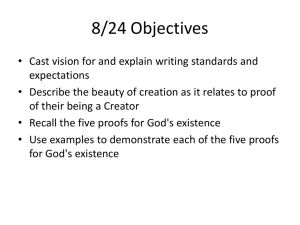Stephen Covey - WordPress.com
advertisement
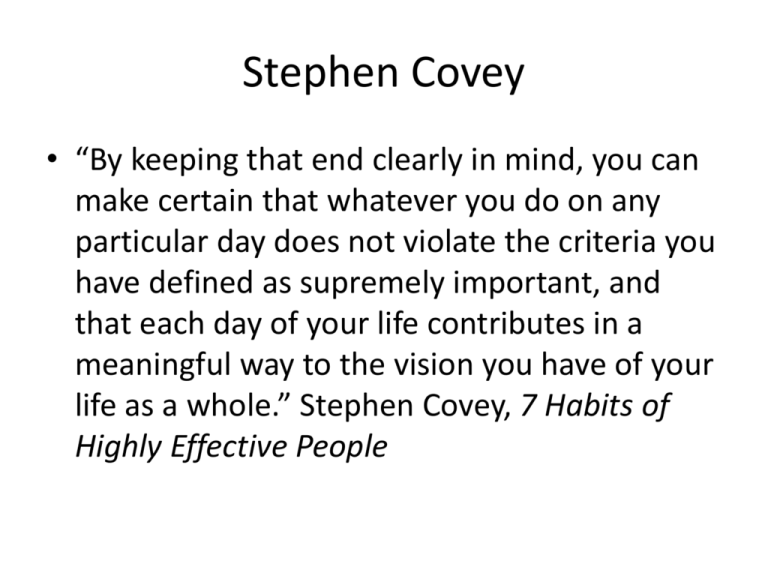
Stephen Covey • “By keeping that end clearly in mind, you can make certain that whatever you do on any particular day does not violate the criteria you have defined as supremely important, and that each day of your life contributes in a meaningful way to the vision you have of your life as a whole.” Stephen Covey, 7 Habits of Highly Effective People Stephen Covey • “It is possible to be busy—very busy— without being very effective…People often find themselves achieving victories that are empty, successes that have come at the expense of things they suddenly realize were far more valuable to them.” Stephen Covey, 7 Habits of Highly Effective People Self-awareness 9/8/15 objectives • Explain basic principle, “Begin with the end in mind” • Recall effectiveness as it relates to busy activity • Paraphrase importance of self-awareness as it relates to second habit and practice with seven-step prayer process 9/9/2015 objectives • Define "first creation" and "second creation" • Differentiate between leadership and management • Paraphrase importance of having a personal mission statement Spinal tap First and Second Creation • “Begin with the end in mind” is based on the principle that all things are created twice. There’s a mental or first creation, and a physical or second creation to all things.” Stephen Covey, 7 Habits of Highly Effective People Leadership vs. Management •We are Marshall • “Management is a bottom line focus: How can I best accomplish certain things? Leadership deals with the top line: What are the things I want to accomplish?” Stephen Covey, 7 Habits of Highly Effective People Question •Is leadership the first creation or the second creation? • “Efficient management without effective leadership is, as one individual has phrased it, ‘like straightening deck chairs on the Titanic.’ No management success can compensate for failure in leadership. But leadership is hard because we’re often caught in a management paradigm.” Stephen Covey, 7 Habits of Highly Effective People The Panama Canal 9/9/2015 objectives • Define "first creation" and "second creation" • Differentiate between leadership and management • Paraphrase importance of having a personal mission statement Becoming your first creator •Julie and Julia Imagination and conscience • “Through imagination, we can visualize the uncreated worlds of potential that lie within us. Through conscience, we can come in contact with universal laws or principles with our own singular talents and avenues of contribution, and with the personal guidelines within which we can most effectively develop them.” Stephen Covey, 7 Habits of Highly Effective People Some examples Mission Statements • Mission statements give context as an individual or an organization strives to become or continue to be his or its first creator. FOCUS • “To know Christ Jesus and to fulfill his great commission by first living and then communicating the fullness of life within the family of God, the Church.” MCPS • “Montgomery Catholic Preparatory School is an integral part of the Catholic Church's mission to proclaim the gospel of Jesus Christ. As an adult community, we share in the responsibility to prepare students for college and beyond while helping them grow to become persons of faith, virtue and wisdom.” Chick-fil-a • “To glorify God by being a faithful steward of all that is entrusted to us. To have a positive influence on all who come in contact with Chick-filA.” Southwest Airlines Mission Statements • Mission statements give context as an individual or an organization strives to become or continue to be his or its first creator. 9/9/2015 objectives • Define "first creation" and "second creation" • Differentiate between leadership and management • Paraphrase importance of having a personal mission statement 9/10/2015 objectives • Define different types of centers • Diagnose out of which center you live your life • Explain the principled center broke Before the second creation… • Before you craft your personal mission statement and begin living it out, you must diagnose out of which center you live your life. If it is not principlecentered, you must-acting as your first creator-rescript your interior paradigm. Real-life example The principle-centered Response 1. You are proactive and don’t respond to external conditions. You make the prudent decision after knowledgeably weighing the factors. 2. You make the decision not based on shortterm fixes or solutions, but based on longterm results. 3. You examine your values and decide what is the best decision at the given time. 4. Because you have built interdependent relationships, you are able to communicate to 9/10/2015 objectives • Define different types of centers • Diagnose out of which center you live your life • Explain the principled center 9/11 objectives • Explain basics of writing personal mission statement • Begin crafting one's personal mission statement • “Personal responsibility, or proactivity, is fundamental to the first creation…Habit 1 says ‘You are the programmer.’ Habit 2, then, says, ‘Write the program.’ Until you accept the idea that you are responsible, that you are the programmer, you won’t really invest in writing the program.” Stephen Covey, 7 Habits of Highly Effective People Let’s begin… • There are two questions you want to answer in your personal mission statement: 1. What is your mission? 2. How will you accomplish this mission? What is your mission? 1. Why did God create you? 2. What are your strengths, your gifts, your talents? 3. What brings you the most joy/when do you feel most fulfilled? 4. What are your dreams, goals, and aspirations? 5. Is there a specific group of people you enjoy serving? 6. How will you be remembered? 7. What do you want others to say about you? How will you accomplish this mission? • There are four areas you will want to take into account: 1. Social/Emotional 2. Spiritual 3. Mental 4. Physical Social/emotional • What do I need to do socially/emotionally in order to accomplish my mission (With whom do I need to spend time? Who do I need to serve? How do I need to treat others? Are there connections that are not helping me accomplish my mission from which I need to charitably break away?) Spiritual • What do I need to do spiritually in order to accomplish my mission? (Do I need to go on an annual retreat? Do I need to pray daily or weekly? How often will I attend Mass outside of my Sunday obligation? Is there a specific type of prayer that brings me the most joy?)
